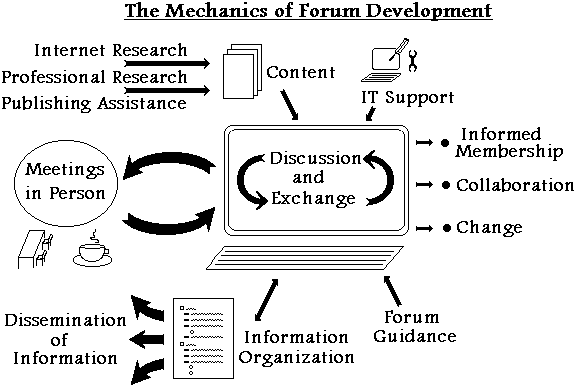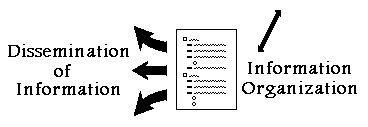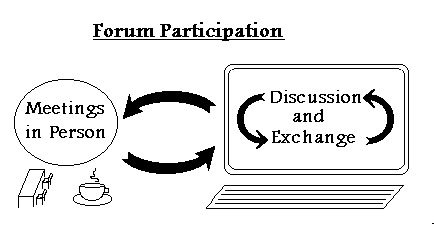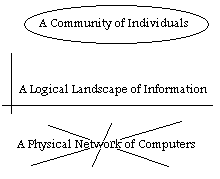 Internet Forums - Theory on Fostering Discussion.
Internet Forums - Theory on Fostering Discussion.
---------- theory & past projects ----------
DRAFT - This is a work in progress. This is also commercially sensitive. This document is not for public consumption as it includes a considerable amount of information about critical business processes. The distribution of this information may also adversely affect the growth of an industry as yet poorly developed. This document is the sole work of David Novak, Director of Community Networking in Perth, Australia.
The Internet is neither simple nor convenient. In many ways, people who use the Internet will endure the same difficulties computer users endured during the 1980's - considerable promise of savings, simplicity and usefulness but much less benefit actually realized. I foresee the Internet will continue to hold the promise of improved work productivity. Most will not realize improvements in productivity. The solution will come from the development of Internet Forums.
1) Three tiers to the Internet.
I do not wish to presume your ignorance of Internet theory, but perhaps the manner which I describe it will serve to highlight certain qualities of the Internet. Let us start with a simple description of the Internet:
The Internet contains three distinct descriptions:
Looking at the Internet in this way, it becomes quite easy to see the uneven development of the Internet over the past few years. 2) Information, Transaction and Entertainment.
Just looking at the information landscape of the Internet for a moment, we can further divide this into a triad of functions of online communication.
Each different segment of the Internet is growing at a different rate, moving in a different direction. The development of forums is firmly in the smallest segment dealing with information. This segment is quite chaotically organized and confusing. 3) Internet Structures.
Another concept. Within the information segment of the second definition of the Internet (the Internet as a landscape of information), there exists certain connections between individual items of information. Let us call these Information Structures. By my count there would be perhaps 20 existing structures which serve to organize the information.
If you are seeking a particular item of information which may exist on the Internet, these are the structures which will assist you to locate them. Thus, when Community Networking wanted to assist the creation of a Western Australian Internet community, our first task was to create an information structure which would assist those seeking information to find it. The importance of this activity can not be underestimated. You must use one or several Internet Structures to locate information on the Internet. If a resource is not linked to any of these Internet structures (as in new web sites or new documents) then no-one can find it! The whole task of promotion is to extend various internet structures to include your new resource. The manner which resources are organized on the Internet demands both skill and time to find information. This situation will not change with the advent of sophisticated web pages - but may change through the use of forums. In a forum, the task of locating new resources of quality and value becomes partly centralized to save each forum member the task of locating the information personally. This becomes of tremendous value to the forum members principally as most members would never have located most of the resources on hand. In June, I located resources of interest to members of the wa-publishing forum involved in creating a publishing policy. This took time, but I located the best resources on the Internet - examples, advise, experience, which members would not have found on their own (or which would not have been worth the 5 hours research to locate it). In time, once a forum or mailing list is established, information begins to flow into the forum from individuals with new resources, reducing the effort required to locate most of the best information that can be found on the Internet. This situation will not change in the near future. The development of pay-per-search search engines and improvements in indexing software will not keep up with the sheer quantity of information flooding onto the Internet. 4) Internet Systems of Communication.
An alternative view of the Internet information landscape rests on the existence of several systems of communication - each based on established tools of communication. Thus we have four principle systems with some gradual flow of information between each.
Looking at the Internet thus illuminates the way qualities of the supporting system affect the way information is exchanged. Each system organizes our thoughts, guides our discussion and limits our activities in unique ways. 5) Local Internet Development.
6) Organizational adoption of the Internet.
1) Overview of a Forum. If you wish to develop communication between individuals, one opportunity is the development of an Internet forum. Members are linked together through the Internet, as well as in person, in what resembles one long discussion stretched over many months. A forum establishes contacts links between individuals, informs members of considerable information and works towards creating discussion, collaboration and change. These forums also works well with a large group if individuals. The following picture describes many of the elements at work in a successful electronic forum:
 It is my conviction Internet Forums to date have been particularly unspectacular in both the degree of personal contact and the effectiveness of valuable communication. This technology will support so much more, if a selection of simple tasks are properly organized.
2) Content. The Internet is a tool to communicate information in a simple, factual format. Despite this, most individuals who join the Internet do not successfully strike up intriguing conversations with others nor successfully locate the information they need on the Internet. This is the ironic quality of the Internet. It presents new Internet users with a world full of useful information, but the sheer quantity of information available tends to make it very difficult to locate information of use. In reality there are very few systems which assist us by delivering information to you. The principle system is the mailing list. In a successful Internet forum, information is delivered in a timely and convenient method. New resources of interest from around the world are brought to the attention of mailing list members either from other members, or if the mailing list is fortunate, from the work of the forum leader/manager. While the quality of information varies dramatically, the Internet holds the promise of convenient delivery of the latest news on the Internet. In fact, the quality of content is the primary drawing card for locating new members. Development of content is one of the most important and persistant roles which must be filled in developing an Internet forum.
 One of the initial tasks in developing communication is to draw together the best resources available and create a core collection of information which can support a more detailed discussion. Without it we have a selection of individuals with much too little information to hold an informed conversation. Of course, once established, important content must still be located and delivered to the membership. This works well in the case of Internet research as without the assistance of an effective Internet forum, each and every member must as individuals research and locate the information which will be of use. Collectively, this is a much simpler task. Once established, members will work to bring documents and information of value to the community - whether this is sufficient for the purpose of a forum is another thing. One of the tasks involved is the publishing of information from organizations not yet actively publishing. This task is actually easier than expected. A simple two step process. Firstly, organizations with potentially useful information are convinced to publish. Secondly, the document are published in a simple, inexpensive form. Existing research into the Internet publishing policy can assist in this process. 3) Information Organization. Once you have the useful content, it is organized on the Internet. At the base of creating an Internet forum is the ability to easily and rapidly publish information electronically. With this ability, important resources are brought to the attention of group and presented in an electronic format. One of the most brilliant effects of this process is the development of a valuable site linking most of the important resources available on a particular topic. This becomes another drawing card for further building or assisting membership.  4) IT Support. The Internet is not one monolithic technology, but a selection of technologies which are developing at different rates - each offering different benefits. Currently, the hot technologies are Internet Chat, RealAudio and Forum type resources. As they develop, these technologies must be incorporated into forums. I have been watching these topic closely and do not yet feel they are imperative nor, perhaps, advisable. I expect my views on this will change by the end of the year.  5) Participation.
 6) Leadership.
 1) What happens? In a successful forum, each of the elements discussed in chapter 2 combine to support a rich discussion between members. Each participant - forum owners, members, observers, sponsors - are enticed to work together in the exchange of information. Several Forums, such as InfoPro, GovPub and Yarn (three global lists I follow), are successful. There is an atmosphere of assistance in these lists, identifying individuals, communicating information of other lists, developing discussion around topical events.
The social arena is an exciting element to the Internet's development. The confluence of Sociology and Research holds the key to realizing a most promising aspect of these technologies: Bringing people together around a pool of quality information
| ||||||||||||||

![[Contents]](conts.gif)
